Basic and additional alternative heating of a private house
Not only the constant growth of energy carriers, namely gas, makes the owners of private houses use alternative sources of heating. Some seek to completely make their own homes autonomous and not depend on gas, electricity and petroleum products. Today we will look at how to make alternative heating of a private house with your own hands and what can be used for this.
Each option will have its own positive and negative factors, so you need to understand them in more detail.
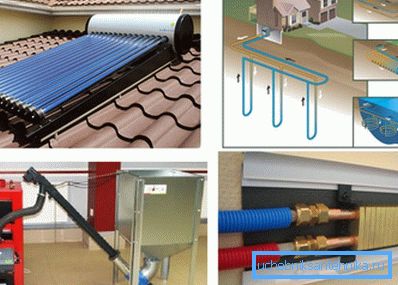
What is called alternative heating
If you think that it means only the use of natural sources such as solar energy, you are mistaken. For example, in rural areas, straw, wood or its sawdust can become an alternative to gas, i.e. everything that can be cheaply used to generate heat.
And, here are those for whom nature conservation has a non-empty sound and do not want to pollute the atmosphere once more with greenhouse gases, they are more focused on energy that is safe for the surrounding space - the sun, earth or wind. Alas, such alternative heating systems of a private house are still quite expensive and have been paying off for many years.
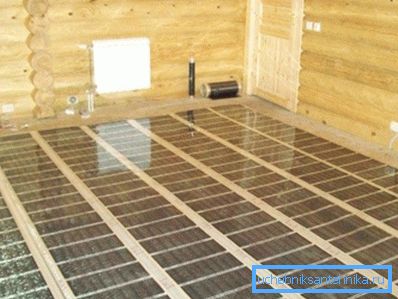
Strangely enough, the use of a gas boiler as the main source of heat should have a lot of advantages, for example, very many households are heated this way, even if the price of fuel is high. However, the requirements for the quality of heating are constantly increasing.
In addition, to connect the gas boiler to the main line is technologically very difficult. Big problems will arise at the stage of registration of the necessary documents.
Complaints will subsequently cause and the quality of heat. It is not a secret that it is quite difficult to heat the room evenly with a boiler - in different places its temperature can be very different.
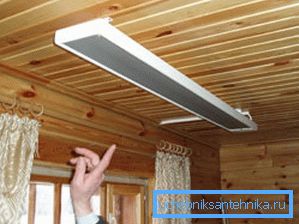
If we consider the whole modern alternative to gas, we can note the following equipment:
- boilers capable of generating heat from liquid or solid, as well as biofuels;
- heat pumps operating on geothermal energy transformation;
- solar collector that converts solar energy into heat;
- infrared heaters;
- "Warm plinth".
The system “warm floor”, which appeared on the market not so long ago, and which you can install with your own hands, has recently been referred to alternative heating methods. But now they have become quite familiar to many and allow you to completely replace the existing radiator heating or to be a good addition to it in certain places.
Biofuels
Using coal or electricity instead of gas is a popular alternative, but it is not always economically viable. This is especially true of electricity, which, although it does not give off soot and soot, but it can be quite expensive for homeowners.
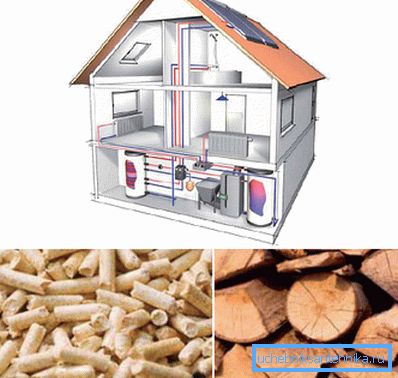
However, there is another way to save money and get the necessary heat in the house - use a boiler that runs on biofuel.
In this case, electricity and coal will be replaced by special pellets and briquettes, which are made from:
- wood chips and wood pellets;
- granulated peat;
- straw pellets.
In this case, you can adjust the automatic supply of fuel to the combustion chamber, and not follow its burning, as it happens when using coal. The only drawback is that the cost of such equipment can be 10 times higher than the cost of gas analogues, and briquettes themselves are not a cheap pleasure.
Tip: a properly arranged fireplace is a good alternative to modern heating methods. With it, you can effectively heat even a small country house.
We use a heat pump
The work of geothermal equipment for heating the home is due to the use of the energy of the earth or water. In summer, the system will function as an air conditioner, helping to cool the building, returning excess heat to the ground. This method of heating is considered environmentally friendly, since the work uses renewable resources.
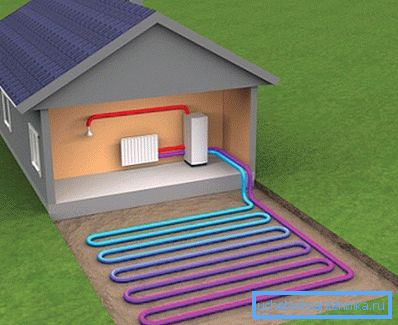
The cost of heating a house with a heat pump, unlike a gas boiler, will be about 15% lower, which will be noticeably noticeable during the season. But, the cost of installing such systems is still too high, so they can not be met so often.
Remember that the heat pump requires a constant supply of electricity. Therefore, it is not necessary to install this system in an area where it is often disconnected.
Tip: the problem is solved by installing an additional generator, but then the cost of operating the heat pump will increase markedly.
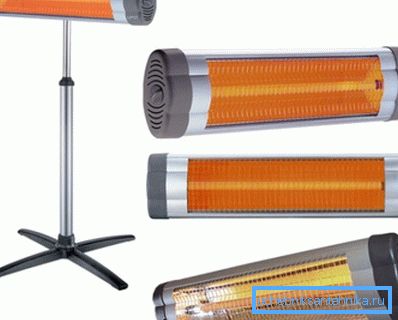
Solar collectors
- Usually they are mounted on the roof of a house, and they often attract the attention of others.
- They resemble plates, with the help of which it is possible to accumulate solar heat and transfer it to the boiler room with the help of heat carrier.
- Then it enters the heat exchanger located in the storage tank.
- The water heated in it can then be used for heating and other domestic needs.
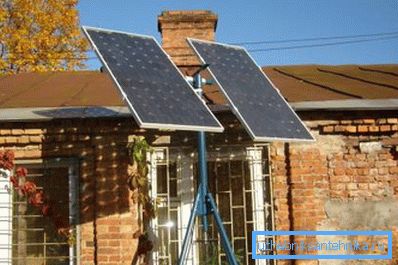
Tip: Provide yourself with an alternative way to heat water, because in cloudy weather and at low temperatures, solar collectors almost do not work.
Although new technologies are capable of providing water heating at air temperatures below zero or if the sun is not visible, it is better to use such equipment in the southern regions of the country, where the number of sunny days is much more. In other places it is recommended to use it as an additional, rather than the main building heating system.
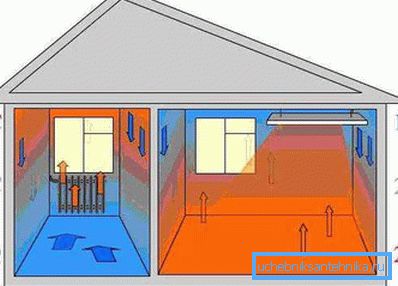
Additionally
| Infrared | This system is widely distributed among consumers. It is presented mainly in two forms:
|
| Warm skirting board |
|
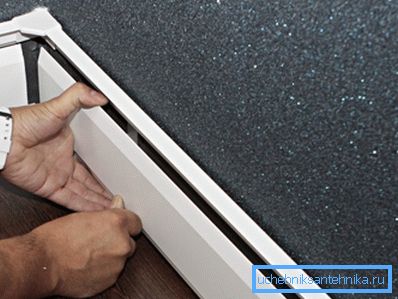
Conclusion
Using alternative types of heating in a private house, you can use the resources provided by nature itself or inexpensive in the area. However, this issue should be approached with caution, since the payback period of many of them is quite high (see also the article Alternative to gas heating: consider the available options).
At the same time, there are enough electricity-based systems capable of supplementing the main heating and reducing the total cost of it. The video in the article will help you find additional information on this topic.